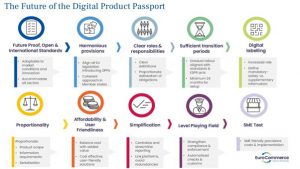The Future of the Digital Product Passport
Position paper - Environment, Sustainability & Energy
Summary Position
Future Proof, Flexible, Open & International Standards. Digital Product Passport (DPP) standards should be future-proof and flexible to adapt to changing market conditions and innovations. They must accommodate the needs of diverse stakeholders, products, and sectors, ensuring interoperability (including across sectors) through open, international standards and decentralised data systems. They should be based on existing business practices.
Harmonious DPP Provisions. With the DPP introduced across multiple EU legislations in parallel to ESPR, it is crucial to prevent fragmented, incoherent approaches, including across Member States. Clear Roles & Responsibilities. The obligations of economic operators should be clearly delineated, and definitions should be clear and harmonious. Retailers and wholesalers should not be liable for manufacturer-provided data beyond factual verification.
Sufficiently Long Transition Periods. Economic operators need adequate time – 24 months minimum for new products placed on the market – to set up DPP infrastructures, collect new and process existing data. The introduction of information requirements should be gradual, consider the maturity (traceability capabilities and transparency) of the global supply chains, and consider the timeline of adoption of the DPP standards and horizontal measures under the ESPR.
Digital Labelling. Digital labels should have an increased role in communicating consumer information. A careful assessment should be conducted per product to determine what is essential/mandatory consumer information that should be kept in paper format, and what information can be communicated only digitally. Flexibility in the display of product information online should be ensured. Proportionality. Considering the costs associated with the creation and managing of DPPs, its introduction should follow a proportionate approach in terms of the products covered, the width of information requirements and level of serialisation. Not all products require a DPP, information requirements should be introduced based on a stepwise approach, and item level serialisation should be limited to specific cases where it offers real added value.
Affordability & User Friendliness. The costs of developing in-house DPP solutions or outsourcing them to service providers should be assessed against the real progress of digitisation in the single market and its measurable potential to reduce administrative burdens—particularly for SMEs. Storing DPP copies externally with service providers will likely raise costs for both businesses and consumers; therefore, this approach should be applied proportionately. Finally, the DPP must be a user-friendly solution—not only for consumers, but also for SMEs without large IT departments—ensuring they can easily access, use, and manage operations related to the DPP.
Simplification. The DPP should be considered when working towards streamlining reporting requirements for products under different EU legislations, so that information is centralised and entered once. Different platforms (e.g. DPP registry, Safety Gate, EU Customs Data Hub, ICSMS, Safety Gate) should be linked where appropriate, to increase the automation of compliance and enforcement. It is essential to avoid redundant statements around data carriers or have multiple data carriers in one product.
Level Playing Field. The DPP should assist in strengthening compliance of products imported from third countries, contribute to border controls and risk-based customs enforcement without complicating trade flows.
SME Test. All measures related to the DPP and its implementation should always consider the burdens and costs SMEs.

